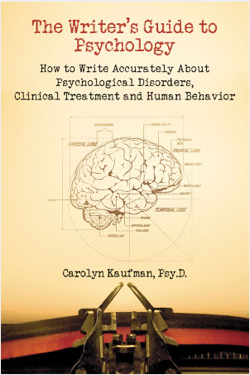Music therapists often complain that the media don’t really “get” music therapy. They share the soundbites and seem unable to accurately portray the nuance that is often a part of our work. Rare is the writer who–like Picoult–is able to truly capture our field.
So, given this history, when I had the chance to review a book related to the misconceptions about psychology, I jumped on it! I mean, surely something as prolific in our culture as psychology is doesn’t suffer the same accuracy woes that music therapy does, right? What do they have to complain about?
As it turns out…plenty.
The Writer’s Guide to Psychology: How to Write Accurately About Psychological Disorders, Clinical Treatment and Human Behavior is intended to serve as “an authoritative and accessible guide to modern psychological practice” for any book, film, or TV writer who wants to incorporate psychology, therapists, and disorders into their work.
The author, Carolyn Kaufman, is herself a clinical psychologist, writer, and writing coach. This gives her a unique perspective when writing a book for writers. She’s successfully straddles both worlds, serving as an authority on psychology, yet providing information that’s relevant and understandable for writers.
The Writer’s Guide covers the following topics:
- Common myths, misconceptions, and mistakes about psychology and psychological practice
- How therapy sessions really work
- The difference between various psychology professionals in how their trained, their theoretical orientations, and degrees
- Several chapters outlining psychological disorders
- How mental health treatment works: the meds, the therapies, even ECT and newer neural treatments (such as deep brain stimulation)
- What a psychiatric facility is really like…and what causes someone to be admitted
It would be easy for this information to be dry and difficult to read. But Kaufman successfully avoids that mistake. As a writer herself, she’s able to explain this material with enough depth, yet written in an easy-to-digest style. As a bonus, Kaufman includes lots of references from both books, TV, and film showing when the writers got it right…and when they got it horribly wrong!
As a music therapist, much of Kaufman’s book served as a nice review of theoretical orientations, mental health disorders, and pharmacological treatments. In fact, I think it’s going to serve as a bonus reference book for me–if I need a brief refresher on a psychological disorder, I’ll pick up Kaufman’s book before the DSM-IV!
In conclusion, I think Kaufman successfully accomplished what she sought out to do: to create a thorough, yet easy-to-understand, guide of psychology and psychological practice. I agree with the author Jilliane Hoffman, who wrote:
“Every writer who even thinks about creating or explaining a character with a psychological disorder should have a copy of The Writer’s Guide to Psychology on their desk, right next to their dictionary and thesaurus.”



 orcid.org/0000-0001-8665-1493
orcid.org/0000-0001-8665-1493






{ 0 comments… add one now }
You must log in to post a comment.